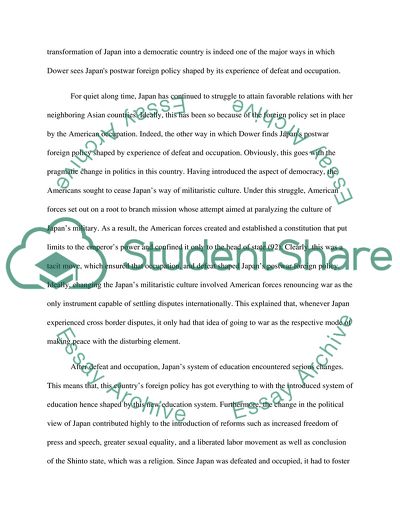Cite this document
(“Japan's Postwar Foreign Policy Essay Example | Topics and Well Written Essays - 1000 words”, n.d.)
Japan's Postwar Foreign Policy Essay Example | Topics and Well Written Essays - 1000 words. Retrieved from https://studentshare.org/history/1602526-identify-three-ways-in-which-dower-sees-japans-postwar-foreign-policy-shaped-by-its-experience-of-defeat-and-occupation-do-you-agree-with-his-view-on-all-three-counts
Japan's Postwar Foreign Policy Essay Example | Topics and Well Written Essays - 1000 words. Retrieved from https://studentshare.org/history/1602526-identify-three-ways-in-which-dower-sees-japans-postwar-foreign-policy-shaped-by-its-experience-of-defeat-and-occupation-do-you-agree-with-his-view-on-all-three-counts
(Japan'S Postwar Foreign Policy Essay Example | Topics and Well Written Essays - 1000 Words)
Japan'S Postwar Foreign Policy Essay Example | Topics and Well Written Essays - 1000 Words. https://studentshare.org/history/1602526-identify-three-ways-in-which-dower-sees-japans-postwar-foreign-policy-shaped-by-its-experience-of-defeat-and-occupation-do-you-agree-with-his-view-on-all-three-counts.
Japan'S Postwar Foreign Policy Essay Example | Topics and Well Written Essays - 1000 Words. https://studentshare.org/history/1602526-identify-three-ways-in-which-dower-sees-japans-postwar-foreign-policy-shaped-by-its-experience-of-defeat-and-occupation-do-you-agree-with-his-view-on-all-three-counts.
“Japan'S Postwar Foreign Policy Essay Example | Topics and Well Written Essays - 1000 Words”, n.d. https://studentshare.org/history/1602526-identify-three-ways-in-which-dower-sees-japans-postwar-foreign-policy-shaped-by-its-experience-of-defeat-and-occupation-do-you-agree-with-his-view-on-all-three-counts.


